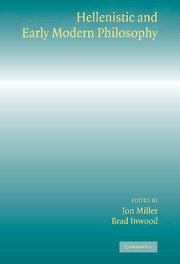Book contents
- Frontmatter
- Contents
- List of Abbreviations
- Notes on Contributors
- Preface
- Introduction
- 1 Stoicism in the Philosophical Tradition
- 2 Early Modern Uses of Hellenistic Philosophy
- 3 Locke's Offices
- 4 Patience sans Espérance: Leibniz's Critique of Stoicism
- 5 Epicureanism in Early Modern Philosophy
- 6 Stoics, Grotius, and Spinoza on Moral Deliberation
- 7 The Discourse on the Method and the Tradition of Intellectual Autobiography
- 8 Subjectivity, Ancient and Modern
- 9 Spinoza and Philo
- 10 Hume's Scepticism and Ancient Scepticisms
- 11 Stoic Naturalism in Butler
- Bibliography of Primary Sources
- Bibliography of Secondary Sources
- Index (general)
- Index (of selected text passages)
2 - Early Modern Uses of Hellenistic Philosophy
Gassendi's Epicurean Project
Published online by Cambridge University Press: 05 August 2012
- Frontmatter
- Contents
- List of Abbreviations
- Notes on Contributors
- Preface
- Introduction
- 1 Stoicism in the Philosophical Tradition
- 2 Early Modern Uses of Hellenistic Philosophy
- 3 Locke's Offices
- 4 Patience sans Espérance: Leibniz's Critique of Stoicism
- 5 Epicureanism in Early Modern Philosophy
- 6 Stoics, Grotius, and Spinoza on Moral Deliberation
- 7 The Discourse on the Method and the Tradition of Intellectual Autobiography
- 8 Subjectivity, Ancient and Modern
- 9 Spinoza and Philo
- 10 Hume's Scepticism and Ancient Scepticisms
- 11 Stoic Naturalism in Butler
- Bibliography of Primary Sources
- Bibliography of Secondary Sources
- Index (general)
- Index (of selected text passages)
Summary
In considering the ways in which early modern philosophers used Hellenistic philosophy, the concept of appropriation is particularly useful. Rather than being the disembodied transmission and reception of ideas, the metaphor of appropriation gives agency to individual thinkers, and enables us to understand them in their own particular historical and intellectual contexts. Ideas do not influence subsequent ideas, nor do they develop by their own intrinsic power. Rather, particular individuals in real historical contexts deploy and develop earlier ideas to solve problems of their own. Thinking in terms of appropriation leads us to think about the historical agents as well as the content of their ideas. We must consider why particular figures were attracted to one tradition or another; how the way they asked their questions affected the use of the ideas they borrowed; and what role their own presuppositions played in their use of the appropriated ideas and texts.
Early modern philosophers often appropriated ideas from ancient philosophy and used them to solve new problems in new contexts. Looking back to classical times, philosophers considered an array of texts that had been deemed canonical, in terms of which they could develop their own positions. In part, this approach was an outgrowth of Renaissance humanism, which was devoted – among other things – to the recovery of ancient sources.
- Type
- Chapter
- Information
- Hellenistic and Early Modern Philosophy , pp. 30 - 44Publisher: Cambridge University PressPrint publication year: 2003
- 2
- Cited by



